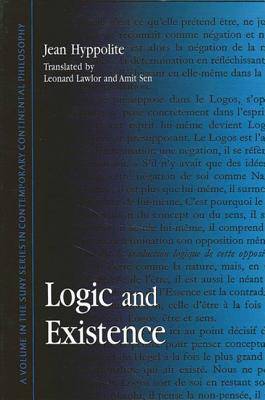
- Afhalen na 1 uur in een winkel met voorraad
- Gratis thuislevering in België vanaf € 30
- Ruim aanbod met 7 miljoen producten
- Afhalen na 1 uur in een winkel met voorraad
- Gratis thuislevering in België vanaf € 30
- Ruim aanbod met 7 miljoen producten
Omschrijving
This first English translation illuminates Hegelianism's most obscure dialectical synthesis: the relation between the phenomenology and the logic. This book is essential for understanding the development of French thought in this century.
Logic and Existence, which originally appeared in 1952, completes the project Hyppolite began with Genesis and Structure of Hegel's Phenomenology of Spirit. Taking up successively the role of language, reflection, and categories in Hegel's Science of Logic, Hyppolite illuminates Hegelianism's most obscure dialectical synthesis: the relation between the phenomenology and the logic.
His interpretation of the relation between the phenomenology and the logic has the result of marking a rupture in French thought. Not only does Logic and Existence effectively end the humanistic reading of Hegel popularized by Kojève in France before World War II, but also it initiates the great anti-Hegelianism of French philosophy in the sixties. Hyppolite's work displays the originality of Hegel's thought in a new way, and sets up the means by which to escape from it. If the phrase "the philosophy of difference" defines French anti-Hegelianism, then we have to say that there would be no philosophy of difference without Logic and Existence. Derrida's notion of differance, Deleuze's logic of sense, and Foucault's reconception of history all stem from this book. This first English translation of the virtually unknown Logic and Existence is essential for the understanding of the development of French thought in this century.
Specificaties
Betrokkenen
- Auteur(s):
- Vertaler(s):
- Uitgeverij:
Inhoud
- Aantal bladzijden:
- 212
- Taal:
- Engels
- Reeks:
Eigenschappen
- Productcode (EAN):
- 9780791432310
- Verschijningsdatum:
- 31/07/1997
- Uitvoering:
- Hardcover
- Formaat:
- Genaaid
- Afmetingen:
- 152 mm x 229 mm
- Gewicht:
- 508 g

Alleen bij Standaard Boekhandel
Beoordelingen
We publiceren alleen reviews die voldoen aan de voorwaarden voor reviews. Bekijk onze voorwaarden voor reviews.











